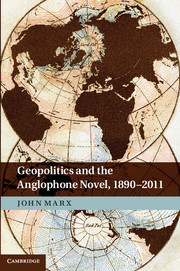Description
Geopolitics and the Anglophone Novel, 1890–2011
Author: Marx John
Explores how literary fiction has imagined the ideal state, from Conrad and Forster to Ondaatje and Ghosh.
Language: English
Publication date: 04-2012
254 p. · 15.8x23.5 cm · Hardback
254 p. · 15.8x23.5 cm · Hardback
Description
/li>Contents
/li>Biography
/li>
Literary fiction is a powerful cultural tool for criticizing governments and for imagining how better governance and better states would work. Combining political theory with strong readings of a vast range of novels, John Marx shows that fiction over the long twentieth century has often envisioned good government not in Utopian but in pragmatic terms. Early-twentieth-century novels by Joseph Conrad, E. M. Forster and Rabindrananth Tagore helped forecast world government after European imperialism. Twenty-first-century novelists such as Monica Ali, Chimamanda Ngozi Adichie, Michael Ondaatje and Amitav Ghosh have inherited that legacy and continue to criticize existing policies in order to formulate best practices on a global scale. Marx shows how literature can make an important contribution to political and social sciences by creating a space to imagine and experiment with social organization.
Introduction: the novel's administrative turn; 1. Fiction after liberalism; 2. How literature administers 'failed' states; 3. The novelistic management of inequality in the age of meritocracy; 4. Entrepreneurship and imperial politics in twentieth-century historical fiction; 5. Women as economic actors in contemporary and modernist novels; Postscript: the literary politics of being well attached; Bibliography; Index.
John Marx is Associate Professor of English at the University of California, Davis.
© 2024 LAVOISIER S.A.S.





